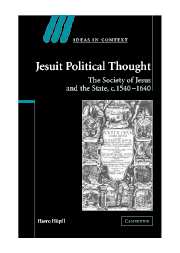Book contents
- Front Matter
- Contents
- Acknowledgements
- List of abbreviations
- Translations, references, and orthography
- Introduction
- 1 The character of the Society of Jesus
- 2 The Society's organisational ideas
- 3 The Society and political matters
- 4 The Church, the Society, and heresy
- 5 The confrontation with reason of state
- 6 Reason of state and religious uniformity
- 7 Jesuit reason of state and fides
- 8 Reason of state, prudence, and the academic curriculum
- 9 The theory of political authority
- 10 Limited government, compacts, and states of nature
- 11 The theory of law
- 12 The common good and individual rights
- 13 Tyrannicide, the Oath of Allegiance controversy, and the assassination of Henri IV
- 14 The papal potestas indirecta
- Conclusion
- Bibliography
- Index
- IDEAS IN CONTEXT
3 - The Society and political matters
Published online by Cambridge University Press: 22 September 2009
- Front Matter
- Contents
- Acknowledgements
- List of abbreviations
- Translations, references, and orthography
- Introduction
- 1 The character of the Society of Jesus
- 2 The Society's organisational ideas
- 3 The Society and political matters
- 4 The Church, the Society, and heresy
- 5 The confrontation with reason of state
- 6 Reason of state and religious uniformity
- 7 Jesuit reason of state and fides
- 8 Reason of state, prudence, and the academic curriculum
- 9 The theory of political authority
- 10 Limited government, compacts, and states of nature
- 11 The theory of law
- 12 The common good and individual rights
- 13 Tyrannicide, the Oath of Allegiance controversy, and the assassination of Henri IV
- 14 The papal potestas indirecta
- Conclusion
- Bibliography
- Index
- IDEAS IN CONTEXT
Summary
SPIRITUAL AND TEMPORAL MATTERS
The Church is, however, obviously not the only collectivity to which Christians belong and owe duties. On the contrary, order is a prime moral good, and obedience is a virtue, irrespective of whether it is the civil polity, the ecclesiastical polity, the Society of Jesus, the family, the corporation, or the city that is the ordering institution and the object of obedience. The documents which have so far been cited for Jesuit insistence on obedience to the Church are no less insistent on obedience to secular rulers. Jesuit catechisms and confessors' manuals treated obedience to spiritual and temporal superiors together, normally in the context of expositions of the Fourth Commandment, as catechisms and manuals had done time out of mind. According to Gabriel Loarte, one of the Society's most celebrated spiritual writers, in his much-admired and reprinted Exercise of a Christian Life, by the Fourth Commandment ‘we are likewise commaunded to carrye the like love, obedience, and reverence to our spiritual fathers, and to al our Superiors; as be Bishops, priests, religious men, and prelates of the Church; kings, princes and secular powers … Hereby are also al parentes and superiours warned, what love and special care they are bound to carry towards their children, and to al such as be their subjects’. But while Jesuit moral theology, casuistry, and a fortiori moral exhortation inculcated dutifulness to secular and spiritual superiors alike, this was simply to skirt the possibility of a conflict of duties.
- Type
- Chapter
- Information
- Jesuit Political ThoughtThe Society of Jesus and the State, c.1540–1630, pp. 53 - 63Publisher: Cambridge University PressPrint publication year: 2004



